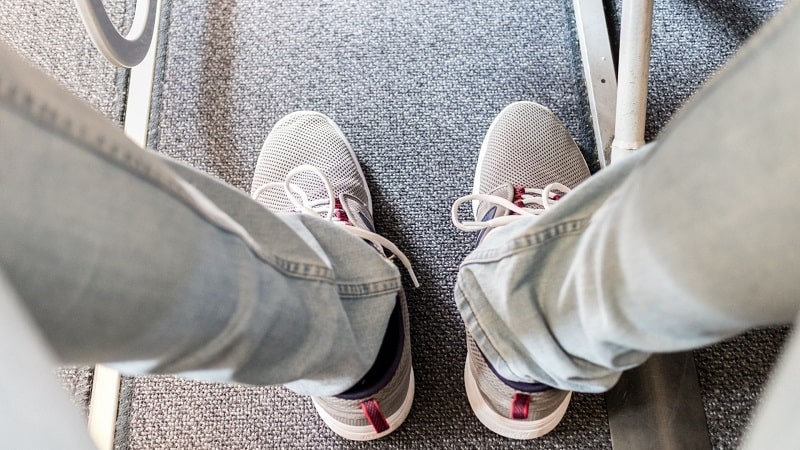Human bodies are made to be active and in motion. Sadly, we all know this is not the case most of the time. Considering our busy schedules and long hours spent with our eyes glued to the screen, incorporating movement and some sort of physical activity in our day seems like a distant dream.
Sitting for long hours tends to exert a lot of pressure on our veins and restricts the natural flow of blood throughout the lower part of our body. Because of this, to seek some comfort, we often resort to putting up our feet while sitting.
Most of us get the urge to sit with our feet up. However, sitting in such a position comes with its fair share of pros and cons. Besides this, there is a lot of physics involved with sitting with our feet up and the consequences that follow.
If you are intrigued by how sitting with our feet up can affect our bodies, keep reading.
Table of Contents
Why Do I Always Want To Put My Feet Up When Sitting?

When you’ve been sitting for a while, there’s a good chance that you always end up with your feet up. For most of us, it happens naturally as a way of putting ourselves in a more comfortable position.
Interestingly, we don’t do it just for comfort. There is sufficient scientific backing on why we put our feet up while sitting, one of which concerns the principles of gravity.
When we sit with our legs in a downward position with our feet resting on the floor, blood tends to get collected in our feet. This restricts the flow of blood, puts excessive pressure on our veins, and can cause potential health implications.
However, as soon as we put our feet up, we can reverse the effects of gravity and facilitate the proper circulation of blood.
Thus, you always want to put your feet up when sitting. In this position, your muscles feel more relaxed and are protected from the horrors of oxygen starvation.
Plus, prolonged periods of sitting in the same position, without moving your feet, or even putting them up, can increase your chances of contracting several vein-related issues and complications, such as varicose veins.
We are often subconsciously aware of all this, and this is why we tend to always sit with our feet up.
What Does Putting My Feet Up Mean?

Putting your feet up is a cue for lack of proper leg elevation, leading to discomfort and distress. This happens whenever you want to feel more relaxed or stretch out your body to escape from any sort of pressure putting on your veins or your lower body. .
Think of putting your feet up as a break from your work, a simple way to relax. You don’t need to take long hours of respite to rejuvenate your body. When you’re under a time crunch but want to give your lower body some rest, the feeling of putting your feet up and sitting in a laid-back and relaxed position is unmatched.
Is It Bad To Sit With My Legs Up On My Chair?

Sitting with your legs up on your chair is undeniably comfortable. But if you’re not careful about how long you sit in that position, things can take an ugly turn and putting your feet up can leave you with more bad than good.
Firstly, by sitting with your feet propped up, you are directly encouraging lousy posture. If you sit constrained to a chair, you are likely to put pressure on your lower back region. This will not only increase backaches but will also put unnecessary stress on your spine.
When a more significant pressure is exerted on the spinal cord and the intervertebral discs, your posture gets distorted, you experience a feeling of numbness, and your body falls victim to increased back pain, even if you sit correctly in an upright position.
So, by all means, take a break now and then to put your feet up. But make sure it doesn’t become a habit. It’s better to get up and stretch out your body.
Is It Good To Elevate Your Feet While Sitting?

If done correctly, it is safe to say that elevating your feet while sitting can offer certain benefits to your health.
Next time when you are skeptical about putting your feet up, these reasons might just make you more relaxed:
#1. You will give your veins a break. Constant pressure on the veins will quickly lead to varicose veins. This is a condition where the veins in your legs become abnormally enlarged and twisted, thus causing aching pain and discomfort. When you elevate your feet while sitting, you mitigate the risk of any vein-related issues or concerns.
#2. When you elevate your feet while sitting, you take some pressure off your feet and protect yourself from any potential leg or foot pain.
#3. When you sit with your feet on the floor for too long, you inevitably start slumping, which can lead to back pain. Elevating your feet can help you keep your back straight and sit with a good posture, thus helping avoid back issues.
#4, The accumulation of blood on your feet due to constant sitting can lead to swelling. When you lift your feet and sit, the blood flows seamlessly throughout your body, which also reduces the risk of any swelling.
Conclusion

If you stumbled upon this article in search of an answer for “why do I always want to put my feet up when sitting,” we hope you found what you sought.
We all know that sitting or standing in any position for an extended period comes with a plethora of health risks that can be hard to get rid of. It is thus necessary to incorporate some sort of movement in your body at regular intervals to not only stretch out your muscles but also help with proper blood flow.
There is no better way out of a stiff and fatigued body than keeping it active and moving. So the next time you feel your leg lacks elevation and has been kept still for a long time, make sure to put it up and save yourself from any long-term potentially damaging health effects.

My name is Vance, and I am the owner of To Ergonomics. Our mission is to improve your workflow by helping you create a supportive and welcoming environment. We hope that you’ll find what you’re looking for while you’re here.

